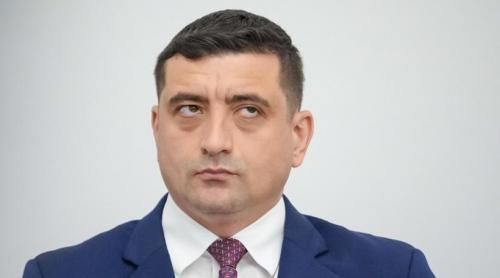
Catalin Harnagea, former director of the Romanian post-communist espionage service, or SIE, gave an exclusive interview to Jurnalul national disclosing less known facts about the war in former Yugoslavia, particularly the involvement of terrorist groups in the fighting and the setting up of training camps for them.
Jurnalul National: Mr. Harnagea could you share with us less known facts about the early â90s in the former Yugoslavia?
Catalin Harnagea: During my holding the top office at SIE there was information that along nationals of the former Yugoslavia also fought and trained terrorist groups. At the time the public attention was converging on the regime of Slobodan Milosevic and none given to the statements the regime in Belgrade made regarding the terrorist breeding ground Yugoslavia turned into, particularly in its Muslim sections. It was thought these were off the wall accusations meant to justify the Serbsâ ethnic cleansing policy; only later in the war the international community took note of what was going on.
JN: Which was the reason for postponing the military intervention in Serbia to stop the ethnic cleansing?
CH: The United States and the European Union could not agree on the way to go: negotiations or military intervention? Instrumental to the final decision were also the information the Serb intelligence services provided on the mujahadeen military training grounds and the presence of well-known terrorists in Croatia and Bosnia-Herzegovina, in particular. The proofs thus gathered showed Western leaders that serious terrorist activities took place between 1990 and 1999 in former Yugoslavia, especially in the territories controlled by Muslims, which endangered security both in Europe and in US.
JN: Was it known the link between Muslims in Bosnia and Kosovo with fundamentalists in Middle East?
CH: There were well known links between the former Bosnian leader Aljia Izetbegovic, honorary president of the Democratic Action Party (Stranka Demokratske Akcije), or Sda, since its foundation in 1990, and terrorists or people suspected of terrorism. At the beginning of the war, Izetbegovic re-connected with his old friend and a member of ruling clique (National Islamic Front) in Sudan, Dr. Elfatih Hassanein-omal-Fatih.
The Bosnian Muslims, through Fatihâs Third World Relief Agency (TWRA), began smuggling arms for their cause in 1992.
American sources suspect that Sheik Omah Abdel Rahman, the radical imam who was convicted of organizing the terrorist attack on the World Trade Centre in New York in 1993 had several links to TWRA.
Several Bosnian Muslims have direct ties with TWRA, including Irfan Ljevakovic, a founder of the Sda, the Bosnian Muslim political wing and the man responsible for bringing mujahadeens to Bosnia-Herzegovina.
Alija Izetbegovic, SDA and Bosnian Muslim president, guaranteed Fatihâs credentials to the Die Erste Osterreich Bank (Austria), enabling him to open an account there.
Erste Bank recently bought the majority stake in Romaniaâs largest lender, Banca Comericiala Romana, or BCR.
The Bosnian Muslims used the bank account to solicit and transit funds for arms purchases.
The Bosnian Muslims, through Fatihâs Third World Relief Agency (TWRA), began smuggling arms for their cause in 1992.
American sources suspect that Sheik Omah Abdel Rahman, the radical imam who was convicted of organizing the terrorist attack on the World Trade Centre in New York in 1993 had several links to TWRA.
Several Bosnian Muslims have direct ties with TWRA, including Irfan Ljevakovic, a founder of the Sda, the Bosnian Muslim political wing and the man responsible for bringing mujahadeens to Bosnia-Herzegovina.
Alija Izetbegovic, SDA and Bosnian Muslim president, guaranteed Fatihâs credentials to the Die Erste Osterreich Bank (Austria), enabling him to open an account there.
Erste Bank recently bought the majority stake in Romaniaâs largest lender, Banca Comericiala Romana, or BCR.
The Bosnian Muslims used the bank account to solicit and transit funds for arms purchases.
JN: Which were the nations which gave financial and logistic support to the military activities in Bosnia-Herzegovina and Kosovo?
CH: There was no confirmation that there were nations behind such activities. But much information confirmed that a series of terrorist organizations, cells, groups were training in the former Yugoslavia.
In December 1995, the French intelligence tracking members of the Algerian terrorist organization Group Islamic Army, or GIA, received information, including video-tapes, proving without a doubt that those people had trained in Afghanistan and Bosnia.
During the civil war in Bosnia-Herzegovina, Kamar Kharban, a leader from the Algerian terrorist organization Islamic Salvation Front, or FIS, and a former officer in the Algerian army, was frequently seen in Bosnia-Herzegovina. A veteran of the Afghanistan war, he visited a suspected Algerian terrorist training base in Bosnia-Herzegovina. It is alleged that the training base serves as a source of false documents for a number of terrorist groups.
There was also the involvement of organizations keeping as front humanitarian organizations, as the TWRA was.
For instance, in April 1999, Italian police in the port of Ancona confiscated three trucks belonging to the Sarajevo humanitarian aid organization "Kruh Svetog Ante" (The Bread of St. Anthony), which was delivering aid to Albanian terrorists in Kosovo and Metohija. The shipment contained six mortars of Croatian manufacture, 352 grenades, 2,600 hand grenades, anti-aircraft and anti-tank shoulder-held rocket systems, sniper rifles with laser scopes, etc. :
In December 1995, the French intelligence tracking members of the Algerian terrorist organization Group Islamic Army, or GIA, received information, including video-tapes, proving without a doubt that those people had trained in Afghanistan and Bosnia.
During the civil war in Bosnia-Herzegovina, Kamar Kharban, a leader from the Algerian terrorist organization Islamic Salvation Front, or FIS, and a former officer in the Algerian army, was frequently seen in Bosnia-Herzegovina. A veteran of the Afghanistan war, he visited a suspected Algerian terrorist training base in Bosnia-Herzegovina. It is alleged that the training base serves as a source of false documents for a number of terrorist groups.
There was also the involvement of organizations keeping as front humanitarian organizations, as the TWRA was.
For instance, in April 1999, Italian police in the port of Ancona confiscated three trucks belonging to the Sarajevo humanitarian aid organization "Kruh Svetog Ante" (The Bread of St. Anthony), which was delivering aid to Albanian terrorists in Kosovo and Metohija. The shipment contained six mortars of Croatian manufacture, 352 grenades, 2,600 hand grenades, anti-aircraft and anti-tank shoulder-held rocket systems, sniper rifles with laser scopes, etc. :
JN Were there information that terrorist attacks to be conducted elsewhere in the world were in fact prepared on the territory of former Yugoslavia?
CH: Yes. There were well-known terrorists, like Ahment Ressemi, an Algerian national, arrested in December 1999 at a U.S.-Canada border crossing in British Columbia - he was in a car full of nitroglycerin and bomb-making materials. American authorities suspected that Ressemi planned to blow up a major structure in the U.S. to start the new millennium.
Ressemi trained along Algerian, Tunisian, Iraqi and Afghan terrorists in Bosnia-Herzegovina, where he fought as a mujahadeen, or an Islamic "holy warrior."
The Jordanian intelligence service, the Mukhabarat, alerted the CIA in 1999 to at least three plots by Bosnia-based Islamic terrorists to attack U.S. targets in Europe.
At the end of the civil war many of the Mujahadeen remained on territories controlled by the Bosnian-Croat Federation instructing Muslim forces in terrorist activities. That activity came to light in December 1995, with the premature detonation of an automobile bomb in Zenica. It is widely speculated that the bomb was meant for U.S. NATO troops serving in Bosnia-Herzegovina as revenge for the life sentence given to Sheik Omah Abdel Rahman, the brain behind the World Trade Centre bombing in New York.
The attack in Zenica led to the raid conducted by NATO forces on the training center of the Bosnian Muslim secret police (AID), located in the ski center near Fojnica in February of 1996, and the arrest of several persons for preparing to conduct terrorist actions.
In the 1997 bombing which destroyed the Al Khobar building in Riyadh, Saudi Arabia, one of the arrested terrorists confessed to serving with Alija Izetbegovicâs Bosnian Muslim forces. He also admitted to ties with Osama bin Laden.
In 1997 surfaced information that a terrorist group trained in Bosnia-Herzegovina, planned the assassination of Pope John Paul II. The assassination was planned towards the end of September 1997. A terrorist group consisting of 20 members holding Croatian, Bosnia-Herzegovina, Tunisian, Algerian and Moroccan passports were to assassinate the Pope during his Bologna visit. The leaders of the group were all former mujahadeens from Bosnia-Herzegovina. Logistical support for the group was secured through a local terrorist network which was closely associated with GIA. Italian authorities discovered the assassination attempt in time and managed to arrest 14 members of the terrorist cell.
Ressemi trained along Algerian, Tunisian, Iraqi and Afghan terrorists in Bosnia-Herzegovina, where he fought as a mujahadeen, or an Islamic "holy warrior."
The Jordanian intelligence service, the Mukhabarat, alerted the CIA in 1999 to at least three plots by Bosnia-based Islamic terrorists to attack U.S. targets in Europe.
At the end of the civil war many of the Mujahadeen remained on territories controlled by the Bosnian-Croat Federation instructing Muslim forces in terrorist activities. That activity came to light in December 1995, with the premature detonation of an automobile bomb in Zenica. It is widely speculated that the bomb was meant for U.S. NATO troops serving in Bosnia-Herzegovina as revenge for the life sentence given to Sheik Omah Abdel Rahman, the brain behind the World Trade Centre bombing in New York.
The attack in Zenica led to the raid conducted by NATO forces on the training center of the Bosnian Muslim secret police (AID), located in the ski center near Fojnica in February of 1996, and the arrest of several persons for preparing to conduct terrorist actions.
In the 1997 bombing which destroyed the Al Khobar building in Riyadh, Saudi Arabia, one of the arrested terrorists confessed to serving with Alija Izetbegovicâs Bosnian Muslim forces. He also admitted to ties with Osama bin Laden.
In 1997 surfaced information that a terrorist group trained in Bosnia-Herzegovina, planned the assassination of Pope John Paul II. The assassination was planned towards the end of September 1997. A terrorist group consisting of 20 members holding Croatian, Bosnia-Herzegovina, Tunisian, Algerian and Moroccan passports were to assassinate the Pope during his Bologna visit. The leaders of the group were all former mujahadeens from Bosnia-Herzegovina. Logistical support for the group was secured through a local terrorist network which was closely associated with GIA. Italian authorities discovered the assassination attempt in time and managed to arrest 14 members of the terrorist cell.
JN: Was the name of Osama bin Laden popping up frequently in those reports?
CH: The most troubling information, but maybe not perceived as such at that time, when bin Laden had not had todayâs record of terrorist attacks, was that the Bosnian Muslim authorities issued a passport to Osama bin Laden himself. The passport was issued in the Bosnian embassy in Vienna, Austria, in 1993.
There was no confirmation that bin Laden ever entered the Bosniaâs or Kosovoâs territory.
Close associates of his did, however, do and were very active there, during the wars in Bosnia-Herzegovina and Kosovo.
For instance Turkish Special Forces arrested Mehrez Audonija, who held a valid Bosnian Muslim passport. The same person was identified as one of Osama bin Ladenâs closest associates. His arrest stemmed from a warrant issued by Italian branch of Interpol in Bologna, which accused him of planning terrorist activities in Italy and being a member of the Algerian terrorist organization GIA
There was no confirmation that bin Laden ever entered the Bosniaâs or Kosovoâs territory.
Close associates of his did, however, do and were very active there, during the wars in Bosnia-Herzegovina and Kosovo.
For instance Turkish Special Forces arrested Mehrez Audonija, who held a valid Bosnian Muslim passport. The same person was identified as one of Osama bin Ladenâs closest associates. His arrest stemmed from a warrant issued by Italian branch of Interpol in Bologna, which accused him of planning terrorist activities in Italy and being a member of the Algerian terrorist organization GIA
Translated by ANCA PADURARU
.
Citește pe Antena3.ro


















